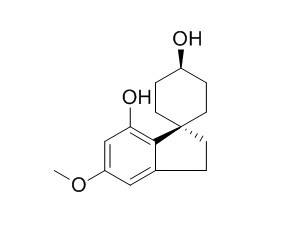Cannabispirol
Cannabispirol has a weak antibacterial effect which is more definite on plasmid carrying bacteria than plasmidless ones, and inhibits intercellular plasmid transfer and transforming activity of plasmid DNA.
Inquire / Order:
manager@chemfaces.com
Technical Inquiries:
service@chemfaces.com
Tel:
+86-27-84237783
Fax:
+86-27-84254680
Address:
1 Building, No. 83, CheCheng Rd., Wuhan Economic and Technological Development Zone, Wuhan, Hubei 430056, PRC
Providing storage is as stated on the product vial and the vial is kept tightly sealed, the product can be stored for up to
24 months(2-8C).
Wherever possible, you should prepare and use solutions on the same day. However, if you need to make up stock solutions in advance, we recommend that you store the solution as aliquots in tightly sealed vials at -20C. Generally, these will be useable for up to two weeks. Before use, and prior to opening the vial we recommend that you allow your product to equilibrate to room temperature for at least 1 hour.
Need more advice on solubility, usage and handling? Please email to: service@chemfaces.com
The packaging of the product may have turned upside down during transportation, resulting in the natural compounds adhering to the neck or cap of the vial. take the vial out of its packaging and gently shake to let the compounds fall to the bottom of the vial. for liquid products, centrifuge at 200-500 RPM to gather the liquid at the bottom of the vial. try to avoid loss or contamination during handling.
J of l. Chroma.&Related Tech2020, 43(11-12):414-423.
Institut Pasteur Korea2020, doi: 10.21203.
Toxins (Basel).2021, 13(12):898.
Korean J of Pharmacognosy2020, 51,49-54.
Front Immunol.2018, 9:2091
Heliyon.2023, e12684.
Drug Chem Toxicol.2020, 1-12.
Aquaculture2019, 510:392-399
Viruses.2021, 13(11):2118.
J Sci Food Agric.2017, 97(5):1656-1662
Related and Featured Products
Acta Microbiol Hung. 1986;33(3):221-31.
The effects of cannabispiro compounds and tetrahydrocannabidiolic acid on the plasmid transfer and maintenance in Escherichia coli.[Pubmed:
3551476]
Some cannabispiro compounds and tetrahydrocannabidiolic acid were tested for antibacterial plasmid curing activity and inhibition of plasmid transfer.
METHODS AND RESULTS:
MIC values of the compound were above 1500 micrograms/ml. Cannabispirol and tetrahydrocannabidiolic acid eliminated the F'lac plasmid from Escherichia coli, but acetylCannabispirol, cannabispirone and cannabispirenone were ineffective as curing agents. Each compound, except acetyl-Cannabispirol, selectively killed plasmid carrying bacteria.
The compounds inhibited R144 plasmid transfer from E. coli into E. coli cells via inhibition of mating pair formation, zygotic killing and inhibition of transconjugal DNA synthesis in a lesser extent. All of the cannabispiro compounds and tetrahydrocannabidiolic acid inhibited the transformation with pBR322 plasmid DNA when the bacteria were pretreated with the compounds, via inhibition of the DNA penetration or decreasing the synthesis of plasmid DNA during bacterial growth.
CONCLUSIONS:
Although each of the compounds, except acetyl-Cannabispirol, had a weak antibacterial effect which was more definite on plasmid carrying bacteria than plasmidless ones, and inhibited intercellular plasmid transfer and transforming activity of plasmid DNA, only two of them were able to cure F'lac plasmid showing that plasmid elimination is a complex process which strictly depends on the stereochemical configuration of curing agents.
Anticancer Res. 2000 Mar-Apr;20(2A):861-7.
Membrane associated antitumor effects of crocine-, ginsenoside- and cannabinoid derivates.[Pubmed:
10810367]
In the present work a systematic study was initiated with crocine, ginsenoside and cannabinoid derivatives on multidrug resistant mouse lymphoma cells, viral tumor antigen expression and some human leukocyte functions.
METHODS AND RESULTS:
Among saffron derivatives, crocin and picrocrocin, triglucosyl and diglucosyl crocetin were ineffective on the reversal of multidrug resistance of lymphoma cells. Ginsenoside increased drug accumulation and tumor antigen expression at 2.0-20.0 micrograms/mL. Some cannabinoid derivatives such as cannabinol, Cannabispirol and cannabidiol increased drug accumulation, while cannabidiolic acid, delta-9-THC and tetrahydro-cannabidiolic acid reduced drug accumulation of the human mdr1-gene transfected mouse lymphoma cells. The reversal of multidrug resistance is the result of the inhibition of the efflux pump function in the tumor cells. Crocetin esters were less potent than crocin itself in the inhibition of EBV early antigen expression. However crocin and diglucosylcrocetin inhibited early tumor antigen expression of adenovirus infected cells, but triglucosylcrocetin was less effective at 0.01-1.0 microgram/mL. The crocin had no antiviral effect [on HSV-2 infected vero cells] up to 25 micrograms/mL concentration. Ginsenosides had a moderate inhibitory effect except ginsenoside Rb1 (was the less effective) on the drug efflux pump.
CONCLUSIONS:
Among the cannabinoid derivatives the cannabinol and Cannabispirol increased drug accumulation, while cannabidiolic acid and delta-8-THC, delta-9-THC and tetrahydro-cannabinol reduced drug accumulation in multidrug resistant mouse lymphoma cells. It is interesting that ginsenosides had a chemical structure-dependent immunomodulating effect by enhancing the activity of NK-cells and ADCC activities.



